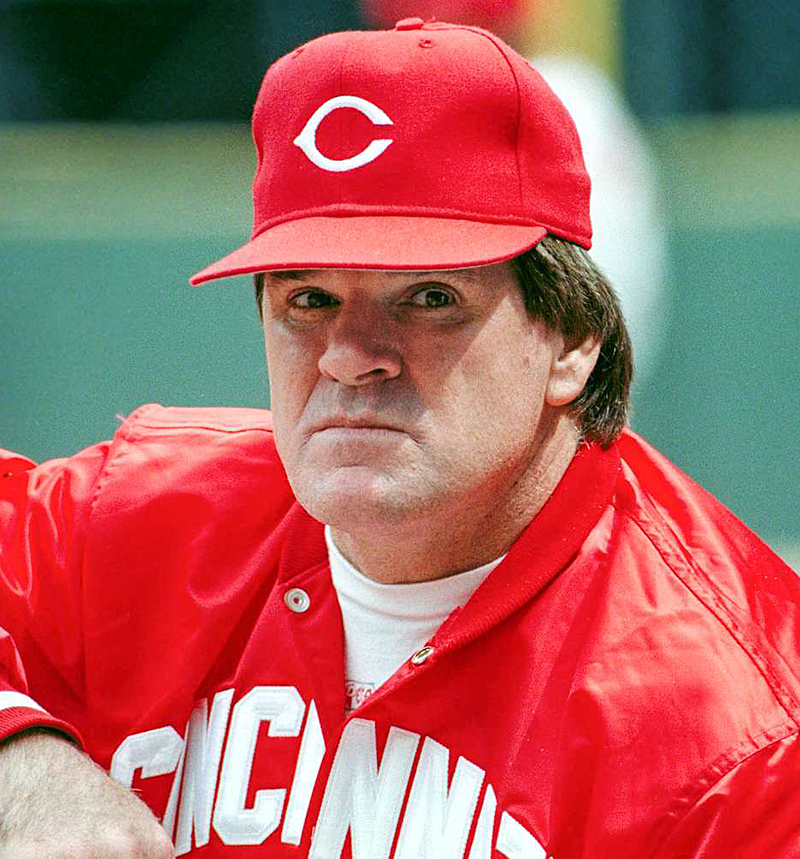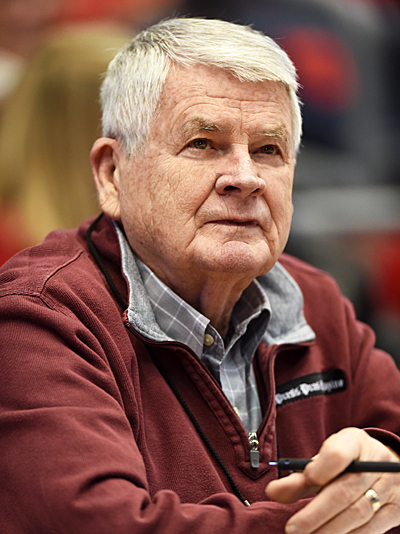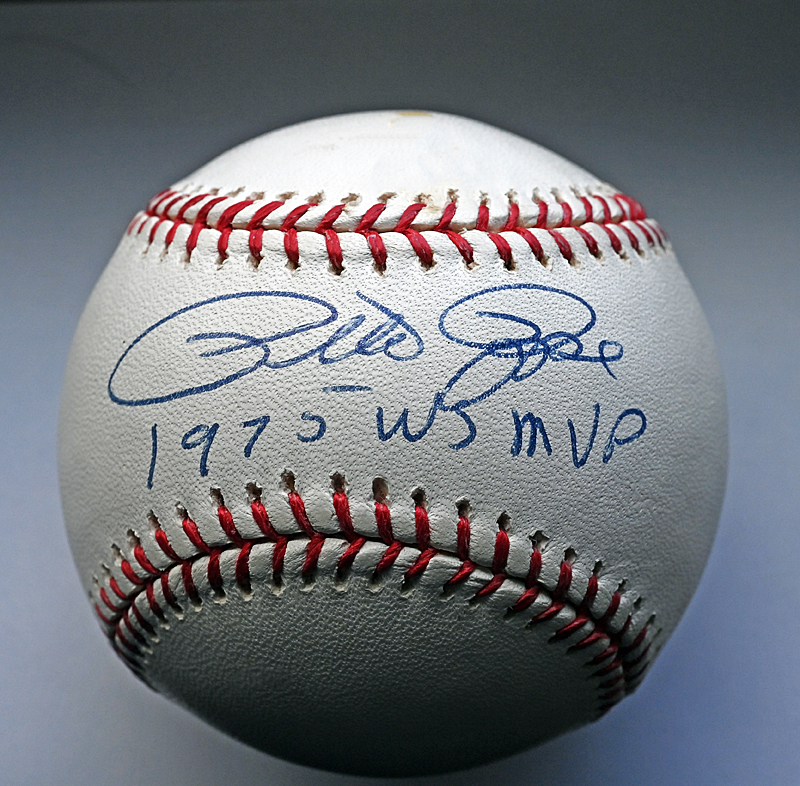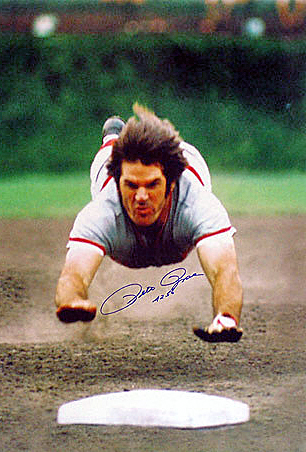
Legends and icons don’t die. Not in your lifetime. Even though he was 83, I never thought about him leaving us. (From Ewing Collection)
My relationship with Pete Rose was complicated, a love-hate proposition for him. But I always loved and respected the Hit King, despite his warts and foibles and failures off the field. Even at his age, I never thought he’d leave us.
 The first thing Pete Rose asked St. Peter: “Where’s the nearest ball park and where’s the nearest race track?”
The first thing Pete Rose asked St. Peter: “Where’s the nearest ball park and where’s the nearest race track?”
Peter Edward Rose, Charlie Hustle, the Hit King, was a flawed man and aren’t we all?
So who are we, or anybody, qualified to judge?
I have grown to acknowledge that there are two guys in the same body — undeniably a man who loved baseball more than any player I ever covered, and the man off the field who had more warts and flaws than anybody can imagine.
It is my firm belief that when he could no longer play the game he needed action. The competitive spirit wouldn’t die.
So despite the consequences, and he knew rule 21 about banishment from the game if he bet on it, he needed this challenge. It is a sickness, the same as alcoholism.

Hall of fame writer Hal McCoy covers the UD Flyers/OSU baseball for Press Pros Magazine.com
There was a day I sat in his Riverfront Stadium office when he was the manager. He pulled out a red notebook and made a phone call.
It was to Sparky Anderson, who was managing the Detroit Tigers. He asked Sparky, “How’s your starting pitcher tonight?”
When he got off the phone and this was before interleague play, I asked him, “Why do you care about Detroit? You don’t play them?”
And his answer was, “Ah, you know me Hal. I just love baseball and like to know what’s going on everywhere.”
I took him at his word until later during baseball’s investigation I heard about his red book in which he jotted his baseball gambling notes.
But, I loved the guy. Always did, always will. There are tears as I try to put words into this piece.
Pete Rose was too tough to die. Legends and icons don’t die. Not in your lifetime. Even though he was 83, I never thought about him leaving us. It was all about having him continue to be an ambassador for the game.
True he made his living signing his autograph. The joke is that the rarest thing in sports is a baseball not signed by Pete Rose. But baseball took away what he did best and the man needed to make a living.
Yes, he was paid to sign. But he delighted fans as he signed, talking about the game, always smiling, always cracking jokes.
But it is true. He is gone and it is so damn difficult to comprehend.
My relationship with him was complicated, a love-hate proposition for him. But I always loved and respected the Hit King, despite his warts and foibles and failures off the field.
When he played, 24 years in the majors, three batting titles, starts at five different positions in All-Star games, a .303 career batting average — enough accomplishments so that his name and picture should be on the cover of the record books — he was the easiest player to cover and write about.
 Ask him a question, one question, poise your pen and he would fill your notebook with enough material, good material, for four stories.
Ask him a question, one question, poise your pen and he would fill your notebook with enough material, good material, for four stories.
Did he love to gamble? Of course he did. Way back in the 1970s he once bet on me in a tennis match against Philadelphia Phillies player/broadcaster Richie Ashburn.
I lost and he lost.
Gambling is when our relationship deteriorated. When the investigation into Rose’s betting on baseball surfaced, the Dayton Daily News had several reporters working on it.
But I was the front man. I was at the games every day. I had to ask Rose the tough questions about the details the DDN reporters and I uncovered. And I have to write the negative, but accurate, stories.
That was a tough situation for me. Pete and I were friends. Before the paper started its investigation, sports editor Ralph Morrow called me into his office and said, “I know you and Pete are close. Can you be part of our investigation?” I was offended because I considered myself professional enough to do my job, as difficult and as heart-tearing as it was.
So when Rose was banished from baseball in 1989, he took a kill the messenger attitude toward me. I was the guy asking the tough questions and writing the stories about his gambling.
He didn’t speak to me for nearly 20 years and often spoke disparaging about me on his radio shows and in his book, “My Prison Without Bars.”
Then my wife, Nadine, and I were in Las Vegas during the All-Star break in 2008. We were walking down a concourse near Caeser’s Palace and spotted Rose in a sports memorabilia shop signing autographs.

Logan Services, in Dayton, Cincinnati, an Columbus, is a proud sponsor of area sports on Press Pros.
Nadine said, “There’s Pete Rose. Go in and say hello.”
I said, “Do you want to start a riot? He hates my guts.”
“You go in there,” she said, giving me a shove.
As I stumbled through the door, Rose saw me, came around the table and shook my hand. He had our picture taken together, had it developed right away, slid it into a leather case and signed it, “To a great Hall of Famer from the Hit King (4,256 hits), Pete Rose.”
And that was the end of the rift. Rose gave me his private telephone number and we talked frequently. Just a month ago he sent me a video in which he ended it by saying, “I love you, Hal.”
From a crusty guy who gave no ground on a baseball field and was negatively uninhibited off the field, that hit me hard.
And not long ago, I gave a copy of Keith O’Brien’s book, “Charlie Hustle,” to my great friend Ryan Roth. He gave the book to his cousin to take to a Rose autograph show not long ago to have Rose sign it.
Roth’s cousin handed Rose the book and said, “Hal gave this to my cousin.”
“Hal who?” said Rose.
The cousin said, “Hal McCoy,” and Pete signed the book with, “Any friend of Hal’s is a friend of mine.”
That is a fantastic thing because it is the last memory I will have of Rose.
It is true that most fans either love Pete Rose or they despise Pete Rose. And as a journalist, I’m supposed to be objective and aloof from a personal relationship. I was always objective in what I wrote about him, but it is difficult not to have personal feelings about somebody with whom you spent more time that with your family.
Indeed, some of his off-the-field stuff, some of the things in his private life, were reprehensible — the carousing, the paternity suits, the gambling, the lies.
But what he did on the field is the stuff of legends, done by a true legend, one of the best baseball players of all time.
 He hurt his chances to make the Hall of Fame by outright lying for nearly 15 years, insisting he never bet on baseball.
He hurt his chances to make the Hall of Fame by outright lying for nearly 15 years, insisting he never bet on baseball.
When he was first called to the baseball commissioner’s, if he had been contrite, if he had said, “Yes, I bet on baseball. I was wrong in doing that. I am so sorry,” he might have served a one-year suspension and already been inducted into the Hall of Fame.
But that wasn’t his nature. He was a stubborn guy. And he thought, “I’m Pete Rose. I’m baseball’s teflon man. They won’t do anything to me. Why should I admit it?”
He was banished 35 years ago. He finally admitted he bet on baseball, bet on the Cincinnati Reds, “Always to win,” and has served his penance.
One of the last things he said to me was, “Ax murderers serve less time than I have. I’ve been an ambassador for the game, been better to it than it has to me. Yes, I bet on baseball. I was wrong.”
And I know there will be detractors out there and disagree. I know all about his off-the-field stuff. Originally, when he was denying, denying, denying, I was against his induction into the Hall of Fame.
But after he finally confessed and after his continued posture as an ambassador to the game, I positively endorse his enshrinement.
It isn’t a baseball Hall of Fame without Pete Rose’s plaque.

